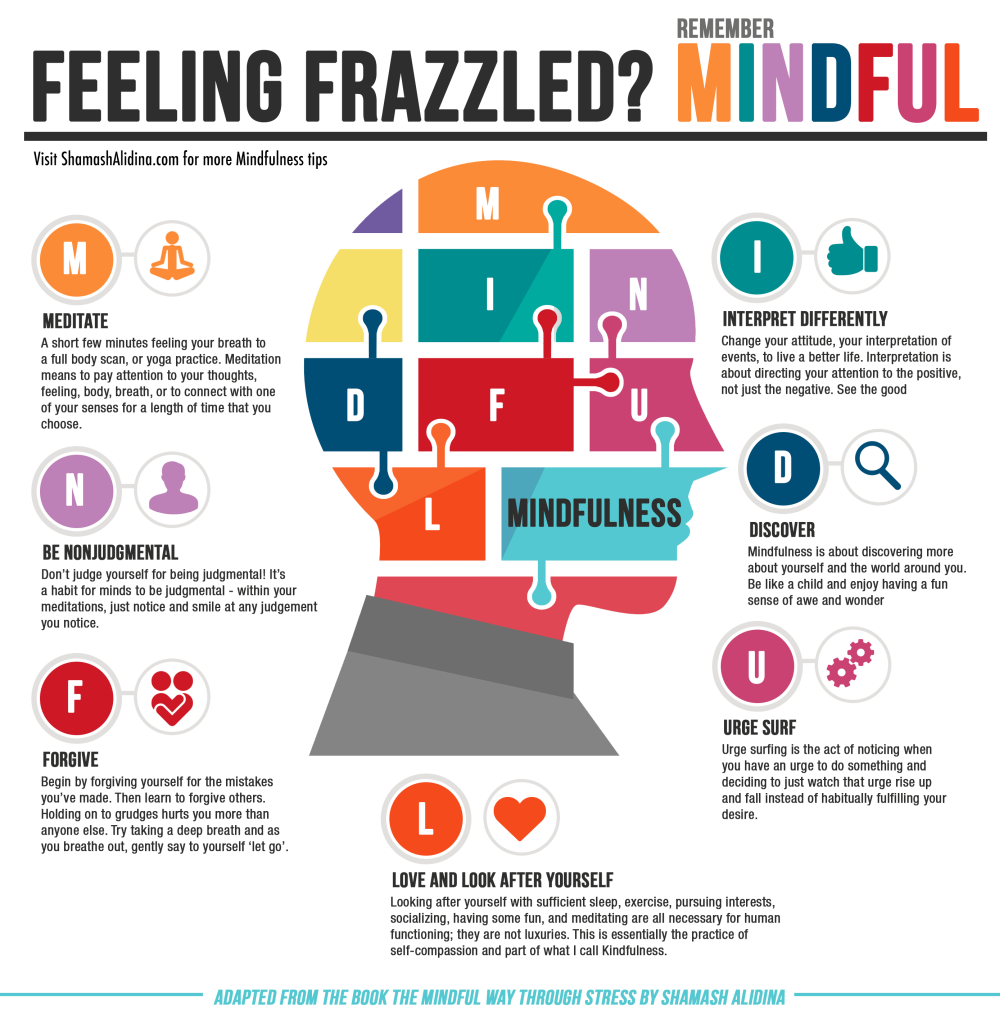Feeling Frazzled? Remember MINDFUL [Infographic]
/Mindfulness is much more than just living in the present moment.
Nowadays a mindful life embraces an attitude and way of being that leads to greater wisdom and peace of mind.
Here’s some suggestions for living mindfully, based on the acronym MINDFUL to make it easier for you to remember.
If you like, feel free to download and print the infographic that summarizes these keys and stick it up on your fridge door or somewhere else to remind you to be mindful.
M – Meditate: There’s many ways to meditate. A short few minutes feeling your breath to a full body scan, expanding awareness meditation, or yoga practice. Meditation means to pay attention to your thoughts, feeling, body, breath, or to connect with one of your senses for a length of time that you choose. Feel free to be creative in what you think of as your daily meditation practice. Drinking tea, swimming, or gardening can all become a meditation when you do them intentionally and with mindful attention in the present moment. Ultimately, meditation is the art of letting go. In the long-run, expect to feel more calm and relaxed. If that’s not the case, you’re probably trying too hard - try some deep breathing exercises or other activity that relaxes you.
I – Interpret differently: Amazing fact - only 10% of your well-being is determined by your outer circumstances! Change your attitude, your interpretation of events, to live a better life. Losing a job sucks, but does it give you a chance to change careers? A tight deadline isn’t fun, but will the stress help to energize and motivate you to work more efficiently? To take an extreme example, when my grandparents died, I was upset and sad of course; I was very close to them. But as time went by I realized that their death also helped the rest of our family become closer. We had a chance to celebrate their life. Their death is sad but also a chance for us to use the gifts they gave us. Interpretation is about directing your attention to the positive, not just the negative.
N – Be Nonjudgmental: When you’re practicing mindfulness, the idea is to be nonjudgmental. Our perfectionistic society has trained us to perpetually look for what’s wrong and try to improve it. But recall the last time you saw a scene of great beauty--perhaps a beautiful landscape of rolling hills and trees. Did you think "That tree’s a bit short" or "That hill isn’t quite curvy enough"? Of course not. You looked nonjudgmentally. You were mindful and enjoyed the moment. You can judge to make decisions, but make time to stop judging every day too.
Tip - don’t judge yourself for being judgmental! It’s a habit for minds to be judgmental - within your meditations, just notice and smile at any judgement you notice.
D – Discover: Mindfulness is about discovering more about yourself and the world around you. You become a scientist of your own laboratory--and that laboratory is your body and mind. Notice your habitual patterns of thought. Find out what happens when you meditate every single day for a whole week. Explore what effect fully accepting a so-called negative emotion has on you.
F – Forgive: Begin by forgiving yourself for the mistakes you’ve made. You want to be a more mindful and conscious person. Accept that as a human you have imperfections. You make mistakes like everyone else on the planet. Condemning yourself just adds to life’s burden. Instead, forgive yourself and learn from your mistakes. Then learn to forgive others. Not to say what they did was right but for you to stop holding on to grudges. Holding blame is more painful for you than the other person.
U – Urge surf: This is an unusual one, but I think you’ll find it helpful. Urge surfing is the act of noticing when you have an urge to do something and deciding to just watch that urge rise up and fall instead of fulfilling your desire. This is used in addiction treatment, but in our modern society with the temptations of excessive sweet and fatty food, 24/7 entertainment, cell phones, emails, the Internet and more, we are constantly being tempted. By learning to urge surf, you can notice the urge to check your phone and surf the urge until it passes. Want a second cookie? Feel the urge and see if you can train your brain to sit through it.
L – Love and look after yourself: This is a powerful one, much needed nowadays. You may be giving of yourself too much. Constantly helping others without taking time for rest and renewal will drain you. Then you can’t help anyone. Looking after yourself with sufficient sleep, exercise, pursuing interests, socializing, having some fun, and meditating are all necessary for human functioning; they are not luxuries. This is essentially the practice of self-compassion and part of what I call Kindfulness.
PS: Are you interested in becoming a Mindfulness teacher? Our next Teach Mindfulness Online program session starts in March - learn more here or download the free ebook
Adapted from my book, The Mindful Way Through Stress by Shamash Alidina



